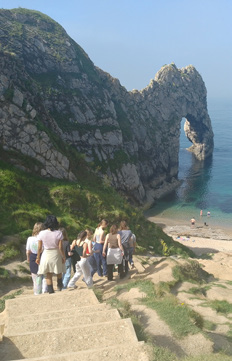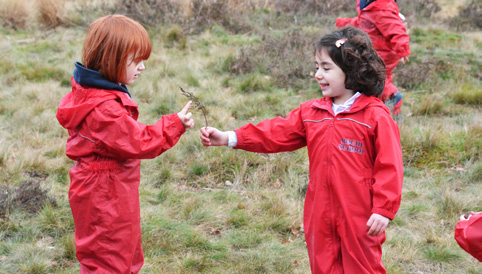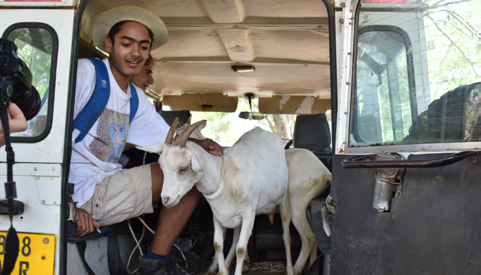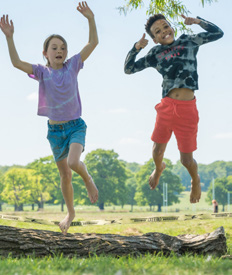Menu
Days out away from the classroom have always been a highlight for school children. They are an opportunity to witness the curriculum in action, to bring a subject alive and to bond with friends. “For many children, their most treasured memories of school come not from the hours of learning in the classroom but from the enriching school trips” says The Roche School Director of Studies, Charlotte Baly. “Children have a great time and they love to talk about everything they are experiencing. The routine of school, although fun and engaging, is broken with a new and unique experience.”
 Giving children the opportunity to try new things and explore and understand a world different to their own is invaluable. “School trips offer children unique experiences beyond the curriculum which develop social skills, confidence, independence, empathy, compassion, and opportunities to practise leadership – all while having fun!” explains Neil Green, Assistant Head (Co-Curricular and Partnerships) at Alleyn’s School.
Giving children the opportunity to try new things and explore and understand a world different to their own is invaluable. “School trips offer children unique experiences beyond the curriculum which develop social skills, confidence, independence, empathy, compassion, and opportunities to practise leadership – all while having fun!” explains Neil Green, Assistant Head (Co-Curricular and Partnerships) at Alleyn’s School.
Even the youngest children can benefit from a day out, while for older children it can offer light relief from a heavy workload. “A nursery trip might involve visits to the forest or to a discovery centre, and we organise residentials for older pupils to enhance independence, such as a cultural French trip, PGL activity holiday and sporty ski trip,” says Charlotte Baly.
Julie Tyler, Camp Director at Camp Suisse voices other benefits: “The essence of being in nature, at its very core, serves to grow and inspire young minds in ways that are not only unique but essential,” she says.
“Residential trips are enabling and positive experiences that allow young people to thrive and flourish and will assist them in developing as people and realising their full potential.”
“We aim to foster passions in children that may hopefully be life long,” says Ed Rees, Head of Hornsby House School. “Where their parents might not have a particular interest, the school can introduce them to a world of opportunity.”
A day away from school can also offer insight for teachers into a pupil’s character and behaviour – everyone changes when they leave the school gates behind and it can be hugley beneficial to interact in a less formal setting.
 Rhona Muir, Deputy Head Community & Co-Curricular at JAGS believes, “young people who find it difficult to contribute or focus in the classroom can come to life in an alternative environment where different skills come to the fore.” Not only that, time away from school can positively enhance teacher pupil relations. “Trips allow the staff and students to be more relaxed with each other, creating a less formal relationship outside the classroom. Staff get to see a totally different side to a student and vice versa – 99% of the time it’s of great benefit to both student and staff,” says Simon Croucher, Assistant Head Co-Curricular, Head of Outings and Expeditions at Dulwich College.
Rhona Muir, Deputy Head Community & Co-Curricular at JAGS believes, “young people who find it difficult to contribute or focus in the classroom can come to life in an alternative environment where different skills come to the fore.” Not only that, time away from school can positively enhance teacher pupil relations. “Trips allow the staff and students to be more relaxed with each other, creating a less formal relationship outside the classroom. Staff get to see a totally different side to a student and vice versa – 99% of the time it’s of great benefit to both student and staff,” says Simon Croucher, Assistant Head Co-Curricular, Head of Outings and Expeditions at Dulwich College.
Living in London, families and teachers are lucky to be able to draw on a rich pool of resources. Outings to Kew Gardens, the Natural History Museum and Institut Francais all support the curriculum to bring a new perspective on topics, incorporate real-life scenarios and add context to academic content. “Visits to museums, galleries, exhibitions, theatres, historical and religious sites, sports and outdoor activities all bring subjects and topics taught in schools to life,” remarks Steve Hill, Assistant Head of Co-Curriculum at Portland Place School. These opportunities encourage and build many transferable skills including developing character, self-belief, motivation, adaptability, team bonding and relationships.
Not all trips are about supporting academic endeavours. Sometimes a day out of school – for no other reasons than for the pure pleasure of the assigned experience – can be just as enriching. Wetherby Senior School Headmaster, Mr Joe Silvester, explains why: “Each term, Wetherby Senior pupils enjoy a Field Day which takes our boys beyond the usual curriculum, extending their learning and knowledge in a fun and memorable manner. Recent activities have ranged from a behind the scenes tour of the Royal Albert Hall and a literary tour of Hampstead to a hike which we then donate to the teams we play from the township.” The Duke of Edinburgh Award Scheme and Combined Cadet Force both have an element of service to the local community. Many pupils have to raise money through cake sales or sponsored events to partially fund trips overseas, and even younger pupils will visit care homes or pick up litter as part of a school day out. It is these occasions that enrich students and broaden their horizons whilst taking part.
 Whether it’s grimacing at the torture chamber in the Tower of London, taking river bed samples in the Surrey countryside, dangling from an abseiling wall on the Isle of Wight or trekking across the ice in northern across the Chiltern Hills.” Theatre trips are back on the agenda and proving incredibly popular with pupils. “Theatre appreciation has always been a big part of school life but, since the pandemic, our optional trips are more popular than ever, with pupils keen to get back into the West End and enjoy fantastic productions, adds Ms Twomey, Head of Drama at Wetherby Senior School.
Whether it’s grimacing at the torture chamber in the Tower of London, taking river bed samples in the Surrey countryside, dangling from an abseiling wall on the Isle of Wight or trekking across the ice in northern across the Chiltern Hills.” Theatre trips are back on the agenda and proving incredibly popular with pupils. “Theatre appreciation has always been a big part of school life but, since the pandemic, our optional trips are more popular than ever, with pupils keen to get back into the West End and enjoy fantastic productions, adds Ms Twomey, Head of Drama at Wetherby Senior School.
| SCHOOL TRIPS – REMOVING MORE THAN THE CLASSROOM WALLS |
|---|
| School residentials are once-in-a-lifetime experiences that foster lasting memories for young minds, serving not only to educate and develop hard skills, but to positively shift the dynamics of the relationships between children and school staff. By taking children away from the convention of the regular school routine, we break through boundaries and allow them to flourish as independent people. The soft skills required to engage and interact on this entirely new level are invaluable. Seeing a maths teacher in a tracksuit or class teacher scrambling up a crag shows their role models in a whole new light – not just formal educators but caregivers, adults, fallible humans, in loco parentis. Children grow, explore and develop in so many ways by going beyond their comfort zone and by sharing that experience with their peers and teachers. Well-rounded people grow from varied life experiences rich in adventure, learning, discovery and development. Source: Camp Suisse |
Residential trips play an important role in children’s personal development. “We offer residential trips from Year 2 upwards,” says Eveline Drut, Executive Head of Eveline Day School. “For many children, these trips are their first experience of being away from their families in unfamiliar surroundings.” Staying away from home helps to develop confidence, independence and resilience, as well as providing new physical activities and challenges, so they represent a great opportunity for personal growth.
The skills learnt and developed through outward bound activities transfer perfectly to the classroom and school in general, ensuring children become confident, well-rounded learners who are able to lead, work collaboratively and listen to others, Ben Evans, Headmaster at Windlesham House School, explained. “The awe and wonder children experience when exploring new destinations, be it inside a historic building, being knee deep in a river, or testing endurance and resilience while climbing a mountain, is second to none.”
 At the older age range, many far-flung trips are on offer among the schools we spoke to, often with a charitable or volunteering aspect. A good example is Alleyn’s: “As part of the triennial South Africa sports trip in 2019, we took just under 100 pupils to South Africa,” says Neil Green. “Our pupils raise funds for Langa Township, take those funds to South Africa and buy sports equipment from local businesses, which we then donate to the teams we play from the township.”
At the older age range, many far-flung trips are on offer among the schools we spoke to, often with a charitable or volunteering aspect. A good example is Alleyn’s: “As part of the triennial South Africa sports trip in 2019, we took just under 100 pupils to South Africa,” says Neil Green. “Our pupils raise funds for Langa Township, take those funds to South Africa and buy sports equipment from local businesses, which we then donate to the teams we play from the township.”
The Duke of Edinburgh Award Scheme and Combined Cadet Force both have an element of service to the local community. Many pupils have to raise money through cake sales or sponsored events to partially fund trips overseas, and even younger pupils will visit care homes or pick up litter as part of a school day out. It is these occasions that enrich students and broaden their horizons whilst taking part.
Whether it’s grimacing at the torture chamber in the Tower of London, taking river bed samples in the Surrey countryside, dangling from an abseiling wall on the Isle of Wight or trekking across the ice in northern Sweden, school trips make the memories that children take from their school days – and create the ones that shape them. “I have seen students return from trips with greater confidence, greater enthusiasm for life and learning, a more focused approach to academic and non-academic work, and personally richer through their shared and individual experience,” concludes Portland Place’s Steven Hill.